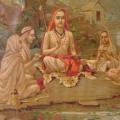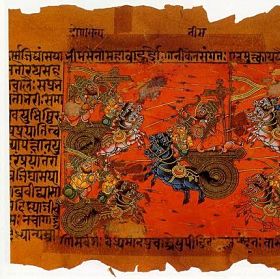25. Communication Breakdown: Bhartrihari on Language
The grammarian Bhartṛhari argues that the study of language is the path to liberation, because the undivided reality underlying language is brahman.
Themes:
• K.A.S. Iyer (trans.), The Vākyapadīya of Bhartṛhari, 4 vols (Poona: 1963, 1965, and 1974; Delhi: 1977).
• J.F. Staal (ed.), A Reader on the Sanskrit Grammarians (Cambridge MA: 1972).
• M. Chaturvedi (ed.), Bhartṛhari: Language, Thought and Reality (Delhi: 2009).
• H.G. Coward and KK. Raja, Encyclopedia of Indian Philosophies, vol. V: the Philosophy of the Grammarians (Delhi: 1990).
• J. Bronkhorst, “Studies on Bhartṛhari 3: Bhartṛhari on Sphoṭa and Universals,” Asiatische Studien 45 (1991), 5-18.
• J. Bronkhorst, “The Peacock’s Egg: Bhartṛhari on Language and Reality,” Philosophy East and West 51 (2001), 474-91.
• J. Brough, “Theories of General Linguistics in the Sanksrit Grammarians,” Transactions of the Philological Society (1951), 27-46.
• R. Herzberger, Bhartṛhari and the Buddhists: an Essay in the Development of Fifth and Sixth Century Indian Thought (Dordrecht: 1986).
• N. Isayeva, From Early Vedanta to Kashmir Shaivism (Albany: 1995).
• B.K. Matilal, The Word and the World (Delhi: 1991), chapters 7 to 12.
• H. Sharfe, A History of Indian Literature, vol.V.2: Grammatical Literature (Wiesbaden: 1977).







Comments
Gaps!
Fascinating. Not related but, looking back over the previous podcasts on the islamic world, I noticed you missed Wang daiyu and the later Han Kitab (though I think Muhammad Rustum mentioned them), will you be covering them in a later series on China?
In reply to Gaps! by Makhfi
Wang Daiyu
Yes, Mohammed mentioned the phenomenon of Chinese sufism. I would indeed like to do an episode on Islamic/Chinese interactions if I do ultimately take on a China series.
In reply to Wang Daiyu by Peter Adamson
Al Biruni
Tackling Al Biruni would also make sense, once you reach the 11th century in the Medieval section (once you tackle it in the future). I believe you once stated that Jonardan Ganeri had already drafted some episodes post Dignaga ? (where you wish to end with classical Indian Philosophy).
In reply to Al Biruni by dukeofethereal
Post Dignaga
Actually we will pretty much wrap things up with Dignaga but we hope to have a whirlwind tour episode just quickly going through the development of later Indian thought - maybe we will return to do it in detail in a further series at some point.
Patanjali of the Mahabhasya
Dear Adam, once again, thank you for a fantastic podcast on Bhartrhari. You've alluded to Patanjali's work as 200CE, but this may be the case for Patanjali of the Yoga Sutra. The majority scholarly consensus for Patanjali of the Mahabhasya is 200 BCE.
In reply to Patanjali of the Mahabhasya by Jai
Patañjali
Oh yes, thanks for the correction - I just wrote AD in the script when I should have written BC. We had the right date in the earlier Panini episode. The Yoga Sutra Patañjali is probably later, like 4th c AD.
Peter
Add new comment